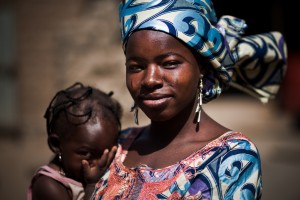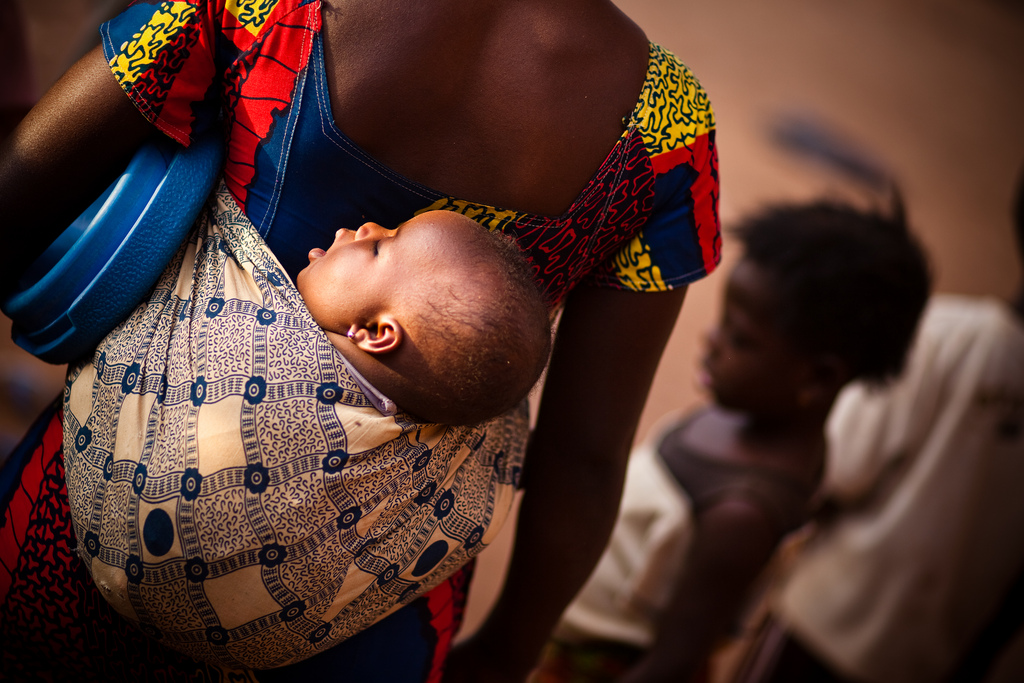If one walks the dirty and muddy paths of the small town of Dédougou, Western Burkina Faso, it might happen that one stumbles upon a new-born lying in the trash at the roadside where pigs and emaciated dogs are grubbing. The mother crouched down next to it, empty gaze, not older than 15, the tattered remains of her clothes maybe even still covered in blood from the delivery.
What sounds like a scene from a horror movie is the result of widely practiced traditional superstition in uneducated Western African tribes according to which an unmarried woman who gets pregnant will bring calamity over the entire village. As a consequence, these young girls, mostly uninformed about the process of insemination and the ease of conceiving a child, are being chased away from their families, relatives and friends and end up in the street, often in prostitution. Not only does this tradition traumatise the woman, it also severely affects the relationship between mother and child. In many cases, the mother, herself still a child, is unable to love her new-born, as she holds the child responsible for her misery.
I met Zénabo when I started volunteering in a little institution, named Haus Yorosin. It is a place where these banished girls can give birth to their babies, get shelter, food and a basic education so that they can sustain themselves eventually. Zénabo never went to school and did not know how old she was – nobody cared about a birth certificate for her when she was born – , but she did love her son Claude deeply when she delivered him, despite the past weeks and months she spent begging and pleading for food in the dusty streets. However, the permanent malnutrition during the pregnancy had left its mark on Claude and severely weakened his immune system. He did not even survive his first week on earth.
Another horror story is that of Marcéline. She was a happy woman, married to a man she loved and with whom she had three little children. One day, however, her husband died unexpectedly and instead of solacing Marcéline, her family blamed her for his death. Believing that her presence would cause further deaths, the villagers chased her away and took her two oldest children, two and three years old, from her. Sylvestre, still a baby at that time, was dependent on his mother and could thus stay with her. After months of begging in the street, a priest brought her to Haus Yorosin where she recovered from sickness, malnutrition and mental breakdown. Now, three years later, she has a job in an orphanage which allows her to support herself and her three year old son. She will never be able to return to her family or her village since she is afraid that they would also take Sylvestre from her.
Many girls across Burkina Faso, Côte d’Ivoire, Mali and the surrounding sub-Saharan states share a similar fate. Most of them come from the poorest groups of society and never went to school, are illiterate and do not know about how to get pregnant or even the dangers of unprotected sex. Their families are living far below the official poverty line of 1.25 USD per day. Education for the numerous children cannot be afforded. Instead, they are expected to work on the fields in order to help provide for enough food to survive. In this situation, these young girls are easy victims for wealthier men who promise them a proper meal in exchange for sex. Not knowing when they will get some food the next time, many girls desperately agree.
 A lot of girls at Haus Yorosin I took care of never learned to read or write. They did not know that the Earth was round, where Africa was situated on this planet and that the same sun also shines in Europe. Most of them had never heard of ‘pizza’ or ‘ice-cream’ and when I showed them pictures of European animals such as squirrels, they wanted to know about every single one whether this was food. And they have dreams: Dreams of a self-sustained life in a little shop in Dédougou, where they could follow their profession as weaver, tailor or hairdresser. Dreams of a family and a loving husband. Dreams of seeing the capital city Ouagadougou. After all they have been through their entire life, they still believe in their future and fight for it.
A lot of girls at Haus Yorosin I took care of never learned to read or write. They did not know that the Earth was round, where Africa was situated on this planet and that the same sun also shines in Europe. Most of them had never heard of ‘pizza’ or ‘ice-cream’ and when I showed them pictures of European animals such as squirrels, they wanted to know about every single one whether this was food. And they have dreams: Dreams of a self-sustained life in a little shop in Dédougou, where they could follow their profession as weaver, tailor or hairdresser. Dreams of a family and a loving husband. Dreams of seeing the capital city Ouagadougou. After all they have been through their entire life, they still believe in their future and fight for it.
It took Zénabo a while to recover from the loss of her child. She stayed at Haus Yorosin and continued her education as a weaver which she successfully finished this year. Constant communication and reconciliation attempts with her family were fruitful at last, and now Zénabo has been reintegrated into her family. Probably however, a major facilitating factor was that Claude was not alive anymore. Yet, the fact that she is now able to sustain herself brought her a lot of respect from her father who now is openly proud of his formerly ‘lost’ daughter.
Meanwhile, young women across the region continue to suffer tremendously due to this unhuman tradition. The greatest problem thereby lies in the lack of education of the large number of very poor people who truly believe this barbaric punishment will keep misfortune away from their homes. Many new-born fatherless children still die every year because nobody cares for them.
In the dirty streets of Dédougou, the sight of a blood-covered young mother has become scarce. Yet, the problem continues to be urgent in many rural areas across sub-Saharan Africa as the dusty roads are still home for countless despaired women who are deprived of dignity and humanity.
By Sarah Pfaffernoschke
Image credit:
Picture 1, 2: Eric Montfort, licensed under CC BY-NC-ND 2.0






